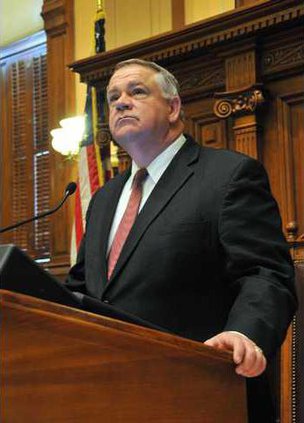When David Ralston is confirmed as Georgia’s 72nd speaker of the state House of Representatives this morning, so will North Georgia’s growing political presence in the state.
Barring a major political upset, Ralston will join Lt. Gov.Casey Cagle, a Republican from Chestnut Mountain, today as the two most powerful men in Georgia’s legislature. Ralston will be the first statehouse speaker from North Georgia in more than 150 years in a legislature that has historically reserved power for the state’s southern leaders.
“For whatever reason, South Georgia long had probably a disproportionate influence (over the legislature),” University of Georgia political scientist Charles Bullock said.
Before the onset of the redistricting revolution of the 1960s, which required districts to be drawn by population, South Georgia held a large number of seats in the state legislature, Bullock said.
“Therefore, one might not be as surprised that the (region’s) influence would be related to that,” said Bullock. “But once you move to requiring that your districts have equal populations, the ability of rural Georgia and rural South Georgia to maintain influence was somewhat more surprising.”
For the past few decades, the southern end of the state’s population has gotten smaller, Bullock said, while North Georgia began to boast some of the fastest growing counties in the state.
But despite its shrinking population, South Georgia’s control of the legislature continued into last decade, a stronghold maintained partly because of Former Speaker Tom Murphy, who controlled the statehouse for 40 years, Bullock said.
Although Murphy, who left the position in 2003, was from Bremen and not South Georgia, many of his close allies were. Murphy kept those allies in positions of power and influence in the Capitol, Bullock said.
With powerful committee chairmen who had South Georgia’s interests at heart, highways were built that crisscrossed the southern region of the state in the hopes of attracting investment and economic development opportunities, Bullock said.
When Murphy left the statehouse in 2003, none of the major positions in the House, including important committee chairmanships, were filled by people from the metro-Atlanta region, Bullock said.
“Once Republicans took over, then Atlanta got a lot more influence in the General Assembly — metro Atlanta, not Atlanta city, per se, but metro Atlanta,” Bullock said.
And now, as Ralston is sure to take the gavel, the days when South Georgia controlled the state legislature seem like a time long gone.
“In a large sense, it shows the rise of North Georgia in a sense of power and influence in the state,” said Doug Collins, R-Gainesville. “I think over the years Atlanta and even South Georgia has a great deal of statewide political clout. I think it just shows a lot of movement in not only population but also in the acknowledgement, or at least acceptance of the influence of North Georgia in the state.”
Cagle, in a written statement, said for both the lieutenant governor and the speaker to call North Georgia home is “unprecedented.”
It may mean that local interests have a little bigger ear to bend, but Greater Hall Chamber of Commerce Kit Dunlap said she doesn’t think North Georgia will get any undue favors.
“I guess it’s always nice to have two folks from the region,” said Dunlap. “But I don’t know if that means anything concrete for our economic development, because he (Cagle or Ralston) would do just as much for economic development for a little county down in South Georgia as they would for us. But he would certainly listen to us and our needs, because jobs, jobs, jobs are important for our needs as well as Gainesville and Hall County.”
The concern is that the balance of power will bring spending to the northern region of the state while neglecting southern and middle Georgia’s interests.
“That’s the reason Larry O’Neal was in (the race for speaker) there running,” said Rep. Carl Rogers, R-Gainesville.
Rogers said the new leadership will be good for North Georgia, but that state leaders try to serve the entire state’s interests. Other legislators echoed Rogers’ sentiment.
While he’s proud that the region’s candidates have been pushed to such powerful positions, Sen. Lee Hawkins, R-Gainesville, said he believes Ralston and Cagle are where they are because of their perceived ability to run the state Rep. DuBose Porter, a Democrat from Dublin, said he hopes that’s true.
“That’s how whoever elected handles their position, and I anticipate that David Ralston will be more open to hearing all sides of this,” Porter said.




